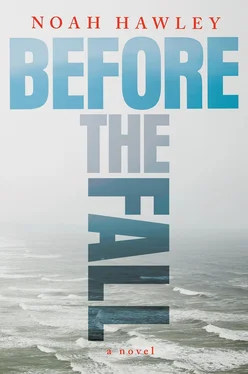“When I got off the bus,” he tells Layla, “I had to run. They were gonna close the airplane doors, right? And, you know, there was part of me that wanted that, to get there and find the plane was already gone. Because then I’d have to get up early and take the ferry like anyone else.”
He doesn’t look up, but he can feel them both looking at him.
“But the door was open. I made it.”
She nods, her eyes wide, and touches his arm.
“Amazing,” she says, though what she means isn’t clear. Is she speaking of the fact that Scott nearly missed the fateful flight, or the fact that he didn’t?
Scott looks up at Layla, feeling self-conscious, like a small bird that has just sung for its supper and now waits for the seed.
“Look,” says Scott, “it’s very nice of you, to see me, to want to throw me a party, but I can’t handle that right now. I just need a place to think and rest.”
She smiles, nods. He has given her something no one else has, insight, details. She is part of the story now, his confidante.
“You’ll stay here of course,” she says. “There’s a guest apartment on the third floor. You’d have your own entrance.”
“Thank you,” he says. “That’s very — and I don’t want to be blunt, but I feel like I should ask — what’s in it for you?”
She takes a hit off her e-cigarette, exhales vapor.
“Sweetie, don’t turn it into some kind of thing. I’ve got the room. I’m impressed with you and your work, and you need a place to be. Why can’t it be simple?”
Scott nods. There is no tension in him, no desire for confrontation. He just wants to know.
“Oh, I’m not saying it’s complicated. You want a secret maybe, or a story to tell at cocktail parties. I’m just asking so there’s no confusion.”
For a moment she looks surprised. People don’t usually talk to her this way. Then she laughs.
“I like finding people,” she says. “And the other thing is — fuck this twenty-four-hour news cycle. This people eater. Just wait, they’re all on your side now, but then they turn. My mom went through it when my dad left her. It was all over the tabloids. And then when my sister had that problem with Vicodin. And last year I had that thing when Tony killed himself, and just because I showed his work they painted this whole picture of us, how I was, like, a gateway drug or something.”
She holds his eye, Magnus forgotten on the other sofa, waiting for his chance to shine.
“Okay,” says Scott after a moment. “Thank you. I just need — they’re outside my house, all those cameras, and — I don’t know what to say other than I went for a swim .”
Her phone bloops. She takes it out, looks, then looks at Scott, and there’s something on her face that makes him shrink inside.
“What?” he says.
She flips her phone around and shows him the Twitter app. He leans forward, squinting at a row of colorful rectangles (tiny faces, @ symbols, emojis, photo boxes) without a hint of comprehension.
“I’m not sure what I’m looking at,” he says.
“They found bodies.”
February 10, 1963–August 23, 2015
Sarah Kipling
March 1, 1965–August 23, 2015
People use the word money like it’s an object. A noun. Which is — that’s just ignorance.”
Ben Kipling stood at a tall porcelain urinal in the wood-paneled bathroom of Soprezzi. He was talking to Greg Hoover, who stood beside him, swaying, pissing against the concave sheen that shielded his dick from view, speckles of piss drizzling down on his six-hundred-dollar tasseled loafers.
“Money is the black vacuum of space,” Ben continued.
“The what?”
“The black — it’s an easement, yeah? A lubricant.”
“Now you’re talking my—”
“But that’s not—
Kipling shook his dick, zipped. He went to the sink, put his hand under the soap dispenser, and waited for the laser to sense his warmth and spritz foam into his palm. And waited. And waited.
“It’s friction, right?” he said without pausing. “This life of ours. The things we do and are done to us. Just getting through the day—”
He made increasingly insistent circular gestures under the sensor. Nothing.
“—the job, the wife, traffic, bills, whatever—”
He raised and lowered his hand, looking for the mechanical sweet spot. Nothing.
“—come on with this fucking thing already—”
Kipling gave up, moved to the next sink, as Hoover stumbled over to a third.
“I talked to Lance the other day,” Hoover started.
“Hold on. I’m not — friction, I’m saying. Drag.”
This time, when he put his hand under the sensor, foam fell gently into his hand. Kipling slumped with relief, rubbed them together.
“The pressure brought to bear on a man just getting out of bed in the morning,” he said. “Money is the cure. It’s a friction reducer .”
He moved his hands under the water faucet, blindly expecting (once more) the sensor to do its job and send a signal to the switch that turns on the tap. Nothing.
“The more money you have — goddammit — the more—”
Enraged, he gave up entirely, shaking soap from his hands onto the floor — let someone else clean it up — and moved to the paper towel dispenser, saw it too was operated by a sensor, and didn’t even make the attempt, choosing instead to wipe his hands on his eleven-hundred-dollar suit pants.
“—money you have, do you see what I’m — it alleviates the drag. Think of the slum rats in Mumbai crawling around in the muck versus, like, Bill Gates, literally on top of the world. Until, ultimately, you have so much dough your whole life is effortless. Like an astronaut floating free in the black vacuum of space.”
Hands clean and dry finally, he turned and saw Hoover has had zero trouble with any of the sensors, soap, water, paper towels. He tore off more sheets than he needed, dried his hands vigorously.
“Sure. Okay,” he said. “But what I’m saying is, I talked to Lance the other day, and he used a lot of words I really didn’t like.”
“Like what? Alimony ?”
“Ha-ha. No, like FBI , for one.”
A certain unpleasant clenching sensation hit Kipling right around the sphincter.
“Which is,” he said, “—obviously — not a word.”
“Huh?”
“It’s a — never mind — why the fuck is Lance talking about the FBI?”
“He’s hearing things,” Hoover said. “ What kind of things? I asked. But he won’t go into it on the phone — we had to meet in a park. At two o’clock in the goddamn afternoon, like the great unemployed.”
Kipling, nervous suddenly, went over and checked under the stall doors to make sure there were no other designer-suit types crapping in silence.
“Are they — did he say we should be—”
“No, but he may as well have. You know what I — because why else would he — especially when — especially because if you think of the trouble he could get in—”
“Okay. Okay. Not so—”
He couldn’t remember suddenly if he’d checked under the last stall, checked it again, straightened.
“Let’s table this,” he said. “I wanna hear it, obviously, but — we need to finish with these guys. Not leave them hanging.”
“Sure, but what if they’re—”
“What if they’re what?” said Kipling, the scotches working like a time delay on a 1940s long-distance phone call.
Hoover finished the sentence with his eyebrows.
“These guys?” said Kipling. “What are you — they came from Gillie.”
“That doesn’t mean — shit, Ben, anyone can be got to.”
Читать дальше












